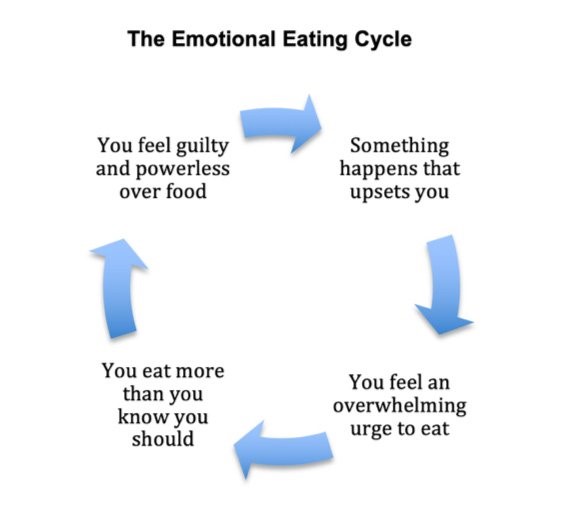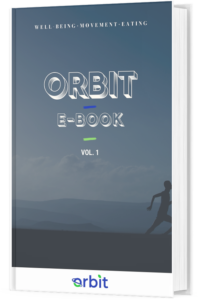Emotional eating means you eat for other reason than hunger. Finding strategies to cope with negative emotions without using food is an important step to becoming an intuitive eater.
Intuitive Eating1 is a book, created by Evelyn Tribole and Elyse Resch, that presents 10 principles to create a healthy relationship with your food, body, and mind. The 10 principles build upon one another. Work on every principle one by one. If you have not read the Principle #1, Principle #2, Principle #3, Principle #4, Principle #5, or #6 please refer to it before getting into this article.
Positive Emotions and Food1,2
Eating is emotional, and emotional can also mean positive emotions.
Eating is a way of bringing people together, is a way of celebrating, is a cultural pride, and is rooted in history. Even though emotional eating is often associated with negative emotions, there are so many positive emotions engrained within our eating experiences.
You may feel gratitude from the romantic dinner your partner cooked. Interest may arise from tasting new foods. Or a sense of pride for cooking a new meal for your family. The feeling of love may also come from eating your absolute favorite food. Gratitude, interest, pride, and love are all positive emotions that may have arisen before, during, or after your eating experience. This would be a positive emotional eating experience.
Checking in with ourselves before a meal is key to knowing if we are eating because of a positive emotion, a negative emotion, or simply because we are hungry.
Negative Emotions and Food1,2,3
We all face difficult emotions. When faced with these emotions, we all manage them differently.
Here are some examples of positive coping mechanisms, which often leads to a calmer, clearer state of mind:
- Meditation
- Taking a walk, or run
- Being able to identify the emotion
- Writing in a journal
Eating comfort foods can also help us feel better, at times!
Here are some examples of negative coping mechanism, which often leads to suppression or avoidance of emotions:
- Drinking alcohol
- Taking drugs
- Overeating
- Smoking drugs
- Dieting
Eating can become a harmful coping mechanism when it is the only one you resort to.
Managing our emotions using positive coping mechanisms has beneficial effects on our psychological health. Reversely, managing our emotions with negative coping mechanism can have lasting damage on our psychological health.
Emotional Triggers and Strategies to Cope
Sometimes, we may not realize we use food as a coping mechanism.
We may think we are overeating because we enjoy the flavors, but really, it is due to other reasons. Emotional eating becomes damaging when we enter the emotional eating cycle, in which we feel guilty and powerless afterwards.

If you notice that you often find yourself eating, despite not feeling hungry, you may be using food to cope with your emotions.
1. Before eating, ask yourself:Am I hungry?
2. If no, how am I feeling?
2. Label your emotion. It may take some time to find out what emotion it is:
- Bored
- Frustrated
- Stressed
- Anxious
- Depressed
- Lonely
Strategies to Cope with your Emotions Without Food
If you are feeling bored:
- Go for a walk as you listen to your favorite podcast, or as you call a friend or family member
- Read 30 pages of a book
- Take a nap
- Make a puzzle
If you are feeling frustrated:
- Write in a journal something positive that happened to you today, or any day
- Write in a journal 5 things you are truly grateful for. Take some time to really hang out with those things you are grateful for
- Meditate for at least 10 minutes
If you are feeling stressed, or anxious:
- Go do some physical activity, and fully focus on the activity you are doing
- Go hang out with your friends and family and talk about fun stuff
- Meditate or breathe deeply
- Exercise regularly
- Sleep 7-8 hours a night
- Dance
- Do some gardening
If you are feeling lonely:
- Call a friend or family member
- Do a video chat with a group of friends or family
- Get absorbed into a book
- Take a walk or jog, and say hello to people passing by
- Ask for a hug, or give yourself a hug for more than 10 seconds
Seeking Help
Tribole and Resch (2012) state that experiencing your emotions in deeper ways once you do not use food to cope anymore is normal. Therefore, seeking help with a professional counselor, therapist, or psychologist may sometimes be needed to develop new coping mechanisms, without using food.





